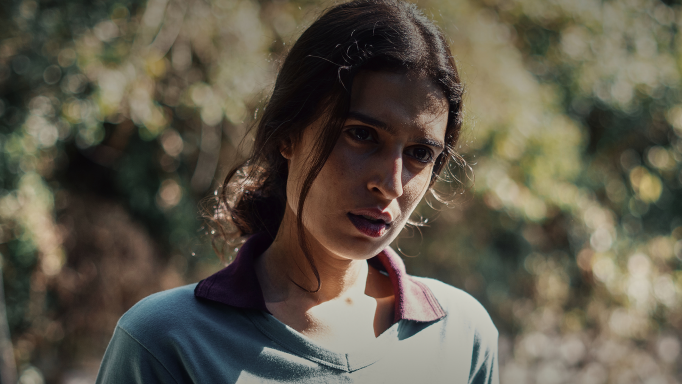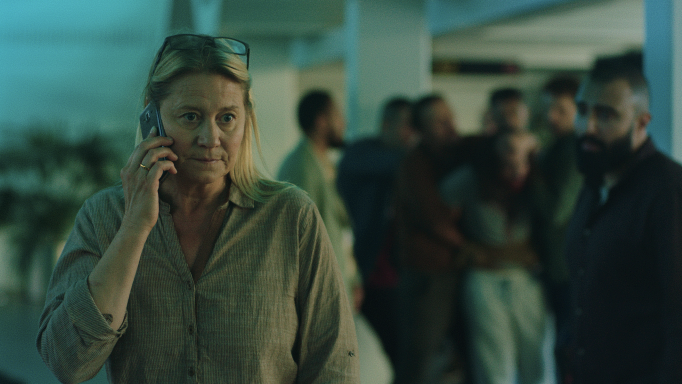A large film festival inevitably includes a variety of films from other countries that we can only hope will find sufficient distribution in the United States. While some of the following films from this year’s Tribeca Festival might be stronger than others, each rewards the attention of the most perspicacious filmgoer.
Shlok Sharma’s Two Sisters and A Husband is set in 1990s India. Three young people, Rajat (Dhinker Sharma), Tara (Avani Rai), and Amrita (Manya Grover), are on the run for a reason not made immediately clear. Amrita is pregnant and beset by nightmares, Rajat is the father, and Tara is her older sister. They have headed north to a mountain resort, where Rajat manages a crumbling hotel; the owner, Bhed Singh (Himanshu Kohli), is mentally unstable, beset by memories of his dead mother. As the three wait for Amrita’s baby to be born, they wrestle with the various demons that have brought them to this rundown place.
Sharma’s film is a traditional yet effective chamber drama, one in which flashbacks and secrets revealed force the characters toward a kind of reconciliation. While there may be elements in the story that strain belief (a certain birthing sequence, a lack of formality to the relationship between Tara and her therapist), the performances are all strong and naturalistic, the atmosphere of sadness is cunningly conceived, and much of the cinematography is excellent. The Himalayas, against which the film is set, are sometimes beautifully used as a backdrop, yet Sharma wisely does not use them as a crutch. Much of the action is set in modest and even decrepit interiors, with natural light leaking in through the windows, making the film feel both intimate and offhand.
Thematic resonance is clearly the goal when it comes to A Matter of Trust, an anthology film from Denmark composed loosely around the theme of trust, directed by Annette K. Olesen. A Danish doctor accompanies deportees on an airplane flying to Afghanistan; a humiliated high school student ends up spending the day with his English teacher; a young girl with a black eye walks along a beach with a mother, who mysteriously refuses to explain why they are on the run; a middle-aged man appears to be having an affair in an Airbnb; and in the last scenario, a young couple, who are expecting a child, walk through the countryside to a funeral. Each story is interspersed throughout, interrupting one another without resorting to cliffhangers.
On one hand, this film is well acted, shot with care, occasionally poignant, occasionally funny. The stories are engaging without relying on suspense. Each leaves out just enough exposition so that we are actively working to fill in the gaps. Most importantly, each section works more or less as a film unto itself.
On the other hand, it is rare to feel that any of these stories goes very deep and that their observations on the betrayal of trust really complement one another when set side by side. The one about the doctor (played by Danish star Trine Dyrholm) who oversees deportees, for instance, is the only story line with any overt political implications, and it is not done any favors by being juxtaposed against the segments that take place within personal and domestic spheres. In other words, one has to be generous to this film to see it as a unified whole—each story has its own tone—and while it aims for ambiguity in its writing, more than once it feels alternately vague or obvious.
However, the scenario involving Emil (Emil Aron Dorph), the young high school student, is often very moving because of the poignant acting, including Anders Brink Madsen as his teacher, and the story of the affair in the Airbnb is often darkly funny, partially because there are so many different kinds of trust we see violated here, often to ridiculous effect.
Finally, the time period in We Might as Well Be Dead is unspecified, though it does not seem to be very far in the future. The setting is a cloistered apartment complex and its surrounding grounds: St. Phoebus, a highly selective community dedicated to protecting itself from the outside world, which has been ravaged in some unspecified way. Its residents are incredibly clean, have their own traditions and celebrations (one song a few residents perform praises the safety of their walled community), and, unsurprisingly, are prone to suspicion. Anna (Ioana Iacob) is in charge of security.
Just when a beloved dog goes missing, Anna’s teenage daughter, Iris (Pola Geiger), shuts herself in the bathroom and only communicates through an opening at the bottom of the door. She believes that her worst thoughts will alter reality and that if she comes out, everyone is doomed. She cites the disappearance of the dog as evidence of her unwanted ability. Soon, the community begins to unravel with paranoia, with Anna at the center, struggling to keep everyone calm.
This German-language film is a fairly straightforward satire on various gated communities. When it chooses to explore moral ambiguity in Anna’s character, it can be striking, for proposing that this community has no moral center, yet this exploration is not fully sustained. Its portrayal of fear mongering is routine, and its contemporary relevance is a little too obvious, though there are some surprises as the story unfolds, and director Natalia Sinelnikova admirably sustains a slow build of tension throughout.
Nevertheless, it is stylish, beautifully acted, and worth the watch. The production design recalls the hideous cleanliness of hospitals and (some) Airbnbs. Many of the shots are similarly resonant, making use of partial openings in doorways in the manner of films like Rosemary’s Baby. Best are the sequences between Anna and Iris, which turn comedic and weirdly poignant.








Leave A Comment